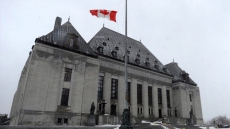Businesses may have started planning for the day when drones help their future plans take flight, but experts say corporate visions will have to stay more grounded for several years.
The regulatory framework that has made Canada a welcoming destination for small-scale commercial drone use is in no way ready for a more broad-based adoption of unmanned aircraft, they said, adding new laws and traffic management systems would have to be in place before more ambitious drone-based projects could take off.
They said such efforts would include the Prime Air initiative that online retail giant Amazon is refining, in part by testing aircraft at an unknown site in rural British Columbia.
Amazon has put forward a tantalizing vision that evokes city skies teaming with drones that deposit packages on customer doorsteps mere moments after they've been ordered.
But lawyers, business owners and drone manufacturers all agree that such a project would be difficult to implement.
"Technically our system is flexible enough to deal with it. In practice ... when the airspace truly becomes congested, we're probably years away from that," said Diana Cooper, Head of Drones and Robotics at law firm LaBarge Weinstein LLP.
The country's regulations for unmanned aircraft are currently spelled out by Transport Canada, Cooper said, adding that there are very few hard and fast rules to date.
The agency has publicly stated several safety measures, such as staying at least eight kilometres away from airports and not hovering over 90 metres, but Cooper said those are merely strongly encouraged guidelines for safe drone use.
Businesses wanting to use drones for day-to-day operations negotiate their own terms with Transport Canada when they apply for a Special Flight Operations Certificate (SFOC).
Cooper says first-time commercial efforts are subject to fairly restrictive SFOCs, adding Transport Canada often relaxes the terms as the relationship becomes more familiar.
SFOCs essentially function as contracts that Transport Canada negotiates on a case by case basis, she said.
Amazon's current testing facility in B.C. was arranged through such an arrangement, but Cooper said the scope of that project falls well within parameters the government is used to working with.
Dave Kroetsch, president of drone manufacturer Aeryon Labs in Waterloo, Ont., agrees, saying the vast majority of projects involve using drones in relatively isolated areas within a human's line of sight.
Companies have, in fact, been using drones to perform everything from agricultural surveys to police crime scene scans over the past 10 years, he said.
When unmanned aerial vehicles (UAVs) move beyond line of sight, Kroetsch said the well-controlled regulatory framework that has served the companies so well essentially ceases to exist.
Kroetsch said such scenarios pose complex questions around liability.
"When there is an accident, because statistically it just will happen, who's responsible ... and how do you deal with that from a regulatory perspective?" he said. "It's not the kind of thing that's really been tackled yet."
Scott McTavish, whose company Accuas Services Inc. performs drone-based surveys across the country, said another problem centres around the available technology.
Developers have come up with the means to sense and avoid obstacles in mid-air, but McTavish said they're far from stable enough to be used over crowded urban settings.
Nor, he said, are the existing options sophisticated enough to duplicate the subtle processes that take place in a human-helmed cockpit.
Avoiding mid-air obstacles presents a prime example:
"The UAV has to make a decision as well," he said. "Just because there's an object coming towards the UAV, that's great, but now you have to have the autopilot make a decision on what direction to go to."
Cooper said even once these hurdles are cleared, businesses could be hampered by the lack of aerial traffic system.
A wild west atmosphere would ensue if drones took to the skies en masse today, she said, but added that NASA has already begun working on an Unmanned Aerial Systems Traffic Management Project to mitigate those issues.
"Basically what they're doing is creating highways in the sky to manage a network of UAVs," she said. "So different vehicles would have access to different airspace, so it would be managed similar to roads. There would be geosensing technologies to try and prevent drones from coming outside of the lane and things like that."
Despite the fact that regulatory and logistical complications will likely take years to resolve, Cooper has no doubt that they will be in the end.
Corporate willpower may even play a role as it did in another high-profile robotic transport project.
"We've had similar arguments against driverless cars, and Google managed to get that approved in the states."





